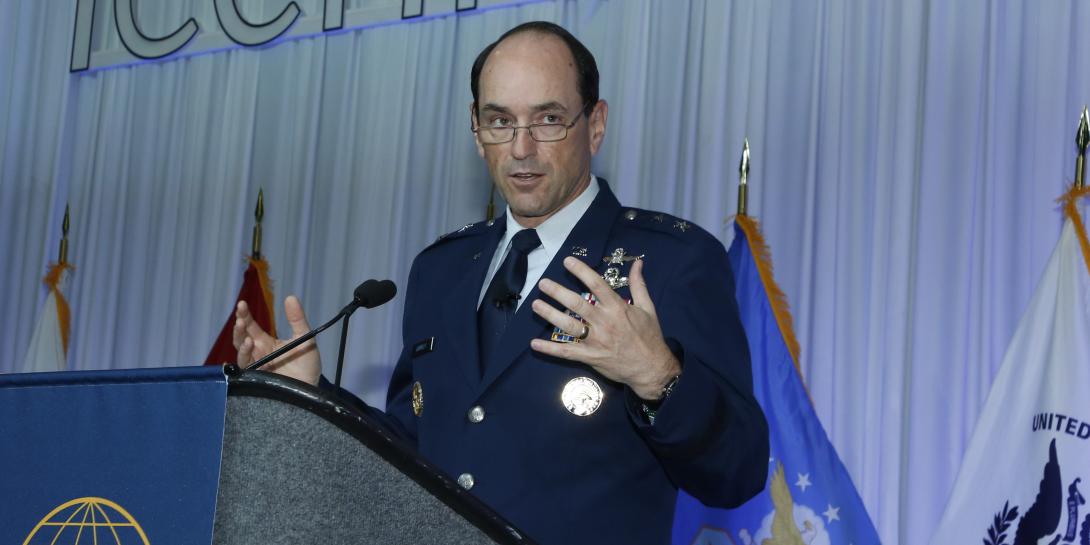U.S. Cyber Command Eyes Enhanced Budgetary Control
One of the priorities that the U.S. Cyber Command is pursuing this year is defining and advancing the Joint Cyber Warfighting Architecture, which is designed to leverage data and cyber intelligence to provide situational awareness and battle management at strategic, operational and tactical cyber mission levels. The construct also includes an array of defensive and offensive cyber capabilities that need to be advanced and will help identify any capability gaps, thereby guiding cyber warfare capability acquisition.
“This is absolutely vital,” said Maj. Gen. Kevin Kennedy, USAF, director of operations, U.S. Cyber Command, providing a keynote presentation on April 28 at AFCEA’s TechNet Cyber conference in Baltimore. “The Joint Cyber Warfighting Architecture is an architecture that integrates the critical capabilities for us to create cyber effects as well as defend the nation.”
It is the proposed budgetary control, however, that will cement the command’s future in regard to its mission operations and Joint Cyber Warfighting Architecture processes.
“What we have now is a federated approach, with federated resourcing throughout the services, all aligned toward the objective of ensuring U.S. Cyber Command’s mission,” the director of operations explained. “But it competes for resources within the service budgets, with no direct oversight by U.S. Cyber Command. That is about to change in the FY24 [fiscal year 2024] budget.”
That enhanced budgetary control within U.S. Cyber Command will enable its leaders to make specific funding choices. “It means that we will have more control over our destiny as well as how the resources are spent within the department to enable our mission,” Gen. Kennedy stated.
The U.S. Cyber Command expects to focus that budgetary control “primarily on our headquarters, our integrated planning elements at the other components, as well as on the command’s Cyber Mission Force and the Joint Cyber Warfighting Architecture,” the general shared. “We are working through that this year.”
Moreover, budgetary oversight is what is needed as the command continues to evolve. “For those that have done programming budgeting before, [you understand],” he noted. “And within the department, we're starting from a participant in various service processes, to having our own process and standing up all of the infrastructure and processes that go with that. It's absolutely vital if we're going to continue to mature U.S. Cyber Command to where we are.”
Maj. Gen. Kevin Kennedy @usairforce, director of operations @US_CYBERCOM: This year we are focusing on enhancing our cyber security service providers & ramping up our ops to ensure no interference in the 2022 election, as we successfully did in 2020 election. #AFCEACyber pic.twitter.com/FEp8YVUdmS
— Kimberly Underwood (@Kunderwood_SGNL) April 28, 2022
The command was stood up in 2010 as a part of U.S. Strategic Command, and in 2018 became a standalone entity.
“It's only been four years as a U.S. Combatant Command and it's pretty amazing from someone that joined the command just two years ago of how far we've come,” Gen. Kennedy said.
The director of operations also commented on Russia’s adversarial cyber attacks relative to its invasion and war on Ukraine. He suggested that the lack of a Russian cyber affront to the Ukraine, the United States or Europe could not necessarily be explained by one factor.
“It is not unfolding as we predicted,” Gen. Kennedy stated. “[Most of us expected] a more visible role or a more effectiveness of cyber. Lots of reasons of why that might have happened. It's probably a more complex answer than just single one answer. It's probably a conflation of [Russia’s] intent, increased resilience [by the United States and Ukraine], lack of capability, lack of will and then also failure of execution, like most operations when you look at them if they didn't go the way you expected.”
In addition, Gen. Kennedy acknowledged that Russia possibly could have new offensive cyber capabilities, but trying to using them inaugurally in a conflict may be a factor.
“One thing I think we need to think about though is when a new technology is first used in an active conflict like this, the first time it is used isn't generally how it ends up evolving in use over time,” he stated. “Our adversaries will learn and then we will learn as we're going forward."





Comments